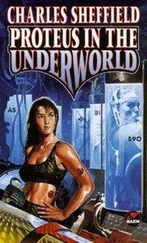“You need to do better than that, ’Rasmus,” Jacob Pole said gruffly. “Why, dammit, I can see that much myself.”
“Patience, both of you. We begin with the easiest. Look along the bar, now, and take the men in order. The first is again too simple: consumption, in its middle stages. The second is in good health. Take the next one, the ex-sailor in the ragged jacket with his back to us. What do you see?”
Joseph Faulkner adjusted the spectacles on his nose, and peered carefully. “Without seeing his face… Hm. At the least, we have the effects of strong drink.”
“Bravo. The half pint of gin clutched in his hand might be considered a clue, but we certainly admit the harmful effects of an indulgence in strong drink. What else?”
“Palsy?”
“No.” Darwin shook his bewigged head in satisfaction. “That is a symptom, not a cause. Regard the uncertain set of the heels on the floor, and the way that the arm moves to reach the glass. You are viewing third-stage syphilis.”
“You are sure?” Faulkner regarded the ex-sailor with a new eye.
“I am positive. He is far gone. If you could see his face, the ravages would become clear. But both of you, consider the man farther along, in the plum-colored fustian, looking this way and getting ready to leave. What of him, Colonel?”
Jacob Pole shrugged. “Ruddy face, clear eyes, a strong, square build. Thick black hair.”
“True enough. But look below the surface. Well, Joseph? What do you say?”
“He ought to be healthy as a horse. But…” Faulkner paused.
“Aha! State your but. Your instincts are sound, Joseph, but you lack the detailed knowledge to support them. My friends, we must go beyond the superficies of hair and frame, if we are to achieve valid diagnosis.” The stammer vanished from Darwin’s voice when the subject was medicine. “Look rather at the color of the lips—is there not a purple tinge to them? Look at the veins in the temples, look at the posture, look at the cheeks, with a suggestion of grey. Look at the strain in his walk. Look at the clubbed fingertips. He suffers from severe and degenerative heart disease.”
The other two men stared again as the black-haired stranger walked out of the tavern. Joseph Faulkner shook his head and took off his glasses. “Bedaddle. You are serious, are you not?”
“Completely. That man has perhaps a year to live.”
“Scampages! If I did not know you to be a recent visitor to London, I would swear those people all must be your patients.” He turned. “Unless you, Colonel Pole?…”
“Not guilty.” Pole shook his head. “I never set eyes on any one of them before.”
“Then you are lucky, Erasmus, that we live in the Age of Reason. Two centuries ago you would have surely been burned for wizardry. When you sense such quick mortality, do you not feel the urge to speak to men and women of their diseases?”
“I do. But then I ask myself, to what end? If that man were my patient in Lichfield, and wealthy, I would certainly discuss his ailment and suggest a change of style in his life. But the unfortunate who left has no such opportunities. He is poor—you saw his shoes?—with no money for medications. Better to allow him to live as happy as he may. With or without my bad news, he will be gone by year’s end.”
Faulkner stood up. “As I must be gone now. I have a meeting across the river in Southwark. Until tonight, gentlemen, at seven?”
“And the renewed pleasure of your company.” Darwin nodded, but he did not rise as their companion buttoned his heavy coat and strode out into the gloom and chill of a February fog. He poured more beef tea, for himself and Jacob Pole.
“Are you suggesting,” Pole said gloomily, “that if I were sick, you would not tell me about it?”
“You mean, if I could not help you? Then I would say nothing.” Darwin was absentmindedly eating his way through the whole tray of cheese and pork savories. “What happiness would it bring you, to know you were victim of some incurable disease?”
“Hmph. Well—”
Pole’s reply was interrupted. The young man who had been hovering by the tavern wall stepped forward to the table.
Darwin did not seem in the least surprised. He merely nodded, and said with a full mouth, “I wondered which of the three of us was the focus of your interest. I am merely surprised that it is I, since I am more of a stranger to this city.”
“I know that, sir.” The other man nodded politely to Darwin and Pole but he was clearly uneasy, shifting from foot to foot. He was bareheaded, blond, and clean shaven, with a blooming fresh-skinned face that scarce needed a razor. “But it is nonetheless you with whom I wish to speak.” He glanced again at Jacob Pole, this time unhappily.
Darwin gazed up at the earnest face. The youth was well dressed and healthy, but there was a certain stolidity of manner and dullness to his eye. “You may speak before Colonel Pole as you would before me. His discretion is absolute. It is, I assume, a medical problem that you suffer?”
“Oh, no sir.” The young man was startled. “Or at least, sir, it is, but not my own. It is the problem of a—a friend of mine.”
“Very well.” Darwin pursed his full lips and gestured to the seat vacated by Joseph Faulkner. “Help yourself to beef tea, and tell me about your friend. Tell all, root and branch. Detail is at the heart of diagnosis.”
“Yes, sir.” The man sat down. He cleared his throat. “My name is Jamie Murchison. I am from Scotland. I came here to study medicine with Doctor Warren.”
“A wise choice. The best doctor in London. You selected him as your teacher?”
“No, sir. My father chose him for me.”
“I see. But if Warren cannot help with your problem, I am convinced that I will do no better.”
“Sir, Doctor Warren’s own health has not been good. Furthermore, he says that you are his superior, especially in matters of diagnosis. But in any case, I did not consult him for other, more personal reasons. You see, the lady with the problem—”
“Lady!”
“Yes, sir.” Murchison paused uncertainly. “Is that bad?”
“No. But I owe you an apology. Nine out of ten who so begin, saying that they have a friend with a medical condition, are actually describing their own problem. I assumed it to be true in your case. Pray continue.”
“Yes, sir. The lady is Florence Trustrum. She is nineteen years old and a second cousin to Dr. Warren. I met her through him. She hails from the Isle of Man, and is now in service at the house of your friend, Mr. Faulkner. That is the other reason why I preferred to entrust this matter to you. Mr. Faulkner does not know me well. Florence and I met each other socially, four months ago. We have become good friends. Two weeks ago, she came to me and confided a strange physical symptom.”
“To wit?”
“In certain circumstances, she feels a crawling sensation on the skin of her face and arms.”
“And that is all?”
“No, sir. At the same time she feels her hair stand on end, as though she has seen a ghost.”
“Hair standing on end. For which a suitable medical term would be? Since you are a medical student, we may as well exploit that fact for the enlightenment of Colonel Pole.”
Murchison frowned and shook his head. “I don’t recall.”
“It is known as horripilation . Remember that.”
“Yes, sir. But it is not horra—horri-pil-ation, as I have read of it. Florence does not see gooseflesh, nor feel any sense of cold or terror when it happens. She says it may occur equally when she is cheerful, or relaxed, or thinking of something else entirely. And so I wondered, sir. In your great experience have you ever encountered any disease with such symptoms?”
Читать дальше












